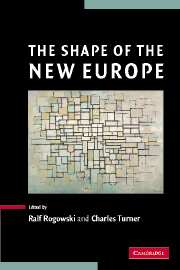Book contents
1 - Europe: Law, Politics, History, Culture
Published online by Cambridge University Press: 22 September 2009
Summary
The enlargement of the European Union (EU) to include ten new states prompted an immediate debate centring on such questions as migration, border controls, labour regulation, the common agricultural policy, the costs of regional subsidies and defence. Such debates are as important as they are inevitable. But enlargement also raised issues that go beyond the agenda of economic, monetary and political integration, issues that concern the limits and integrity of European culture as such. While the accession of Finland, Sweden and Austria during the 1990s increased the size of the EU, membership for the new states which joined in 2004 and for those seeking membership in the future raises questions more profound and far-reaching than those concerning the feasibility of the EU's current decision-making procedures. For most of those new states, membership of the EU is at the same time part of a ‘return to Europe’ in a broader sense. The fact that some of these states have Slavic populations, that some have immature democratic polities, or large peasant populations, or populations which have for centuries been within the orbit of orthodox Christianity or Islam, raises questions about Europe's internal cultural identity. Such questions have become more sharply focused as a result of the larger geo-political and cultural realignments of which Europe is a part.
To be sure, there is no logical reason why debate about European culture and identity should be dependent upon shifts in geopolitics.
- Type
- Chapter
- Information
- The Shape of the New Europe , pp. 1 - 22Publisher: Cambridge University PressPrint publication year: 2006
References
- 2
- Cited by



